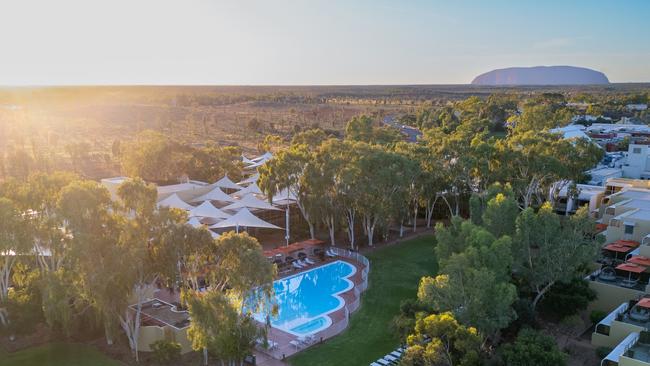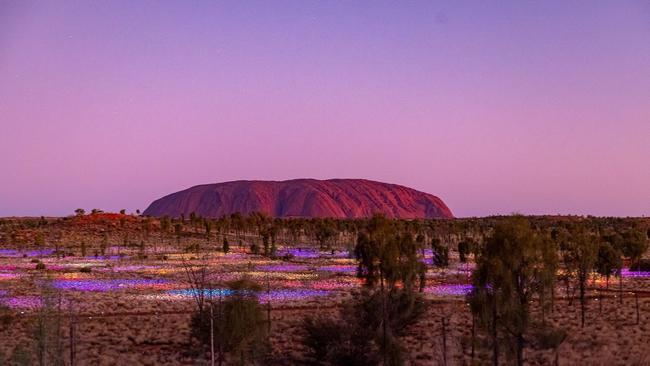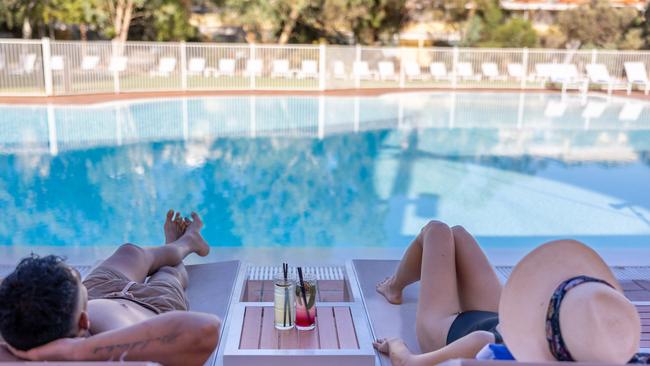Bidders jockey for Uluru resort sale as local player promotes First Nations record
The battle for a long-term lease over the $380m Indigenous-owned accommodation hubs in the shadow of Uluru has prompted warnings against letting the iconic property fall into foreign hands.

Two major corporations, one controlled by US private equity, are jockeying to snare a long-term lease over the $380m Indigenous-owned accommodation hubs in the shadow of Uluru.
The operators of the Ayers Rock Resort at Yulara in the Red Centre earlier this year signalled it would put the world-renowned holdings on the market. Up to six parties have since shown interest, but there are now two groups aggressively jockeying for control, with final bids due soon.
The owners of Darwin, Alice Springs and Tennant Creek airports, Airport Development Group, and the US private equity-backed Journey Beyond, which owns The Ghan and Outback Spirit, are said to be the main two players battling to win the long-term lease.
The local group has staked its claim to the prize resort, telling The Australian that the resort should remain in local hands rather than ending up in foreign ownership, and promoting its credentials with Indigenous communities.
An Airport Development Group spokeswoman said that the company was an Australian-owned and operated business with a “longstanding commitment” to First Nations engagement through Indigenous participation, employment, tourism enhancement, and creating meaningful cultural engagement opportunities.
“We recognise that Ayers Rock Resort and Airport is a unique and treasured Australian asset, and strongly believe that such an iconic destination should remain in Australian hands,” she said.
As a proud Australian company, ADG represents the investments of everyday Australians, through superannuation contributions, and would embrace the responsibility of safeguarding this culturally significant and iconic part of Australia’s heritage,” the spokeswoman said.
Voyages reported total revenue of $186m in the 2024 financial year, up from $182.1m in 2023, an increase of 2.1 per cent. However, it reported a net loss before tax of $20.4m, which was a fall on 2023’s net loss before tax of $8.9m – predominantly due to increasing interest on borrowings and operating cost inflation, according to the company’s accounts.
The Ayers Rock Resort asset was valued by directors at $380m at the end of June, down $55m from the prior year’s adopted value of $435m.
According to its accounts, the ILSC began the formal sale process for the operational assets of its subsidiary, Voyages Indigenous Tourism Australia, in August. The process is ongoing.

Up for grabs are six sprawling accommodation hubs in the shadow of the rock, including a five-star resort, three and four-star hotels and a campground. Voyages has been offering heavy discounts of late. The resort’s performance has been hampered by a lack of flights as well as the cost of flights to Uluru since the Covid-19 pandemic.
However, millions of dollars have been spent upgrading facilities and introducing themed light shows such as Wintjiri Wiru to attract more tourists.
The Indigenous Land and Sea, which controls Voyages, said earlier this year the key objective was to fulfil its statutory obligations of returning land to First Nations peoples, to benefit traditional owners and local, regional and national First Nations peoples.
ILSC appointed Gilbert + Tobin and Greenhill to assist with the assessment process, including understanding interest in the Ayers Rock Resort operations.
With this in mind, the assessment was focused on exploring potential alternative ownership options for the operations at Ayers Rock Resort, it said in February.
Up to six parties initially expressed interest, multiple sources told The Australian on Monday. The Adelaide-based G’day group, backed by the $3bn Australian Retirement Trust, is understood to be one of those groups, but it has since decided against bidding. It declined to comment. Journey Beyond chief executive Chris Tallent could not be reached for comment. Airport Development Group declined to comment.

The ILSC purchased the asset from property company GPT in 2011 in one of the largest sales in the hotel sector, in a deal worth about $300m.
In 2013, the owners of the Ayers Rock Resort wrote down the book value of the resort by $62m, after admitting that it faced serious financial challenges, and high-profile business figures departed the board. Before the pandemic, about 300,000 people visited Uluru annually via 43 direct flights into Uluru from major capital cities. Annual pre-Covid revenue was between $170m and $200m, with the resorts enjoying hotel occupancies of more than 85 per cent.
Mossman Gorge Cultural Centre, which is near Port Douglas and also operated by Voyages, is understood to be part of the deal. It offers visitors guided tours of the Mossman Gorge World Heritage area.
Visitors began climbing Uluru in the late 1930s and, in the lead-up to the rock climb’s closure on October 26, 2019, the Voyages-owned hotels and campgrounds were full to capacity, mainly occupied by Japanese tourists clamouring to climb Uluru in a final rush before it was closed due to requests by the local Anangu people, who had long asked visitors not to climb the sacred site.



To join the conversation, please log in. Don't have an account? Register
Join the conversation, you are commenting as Logout